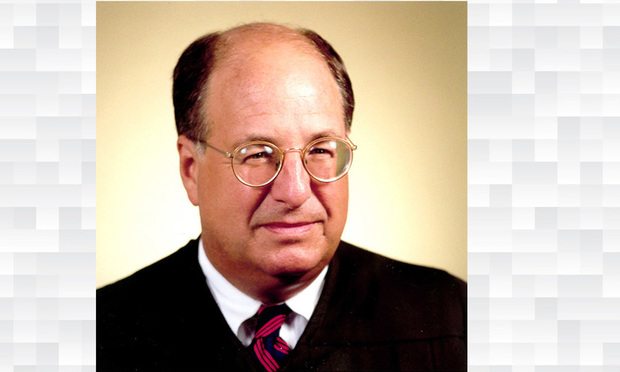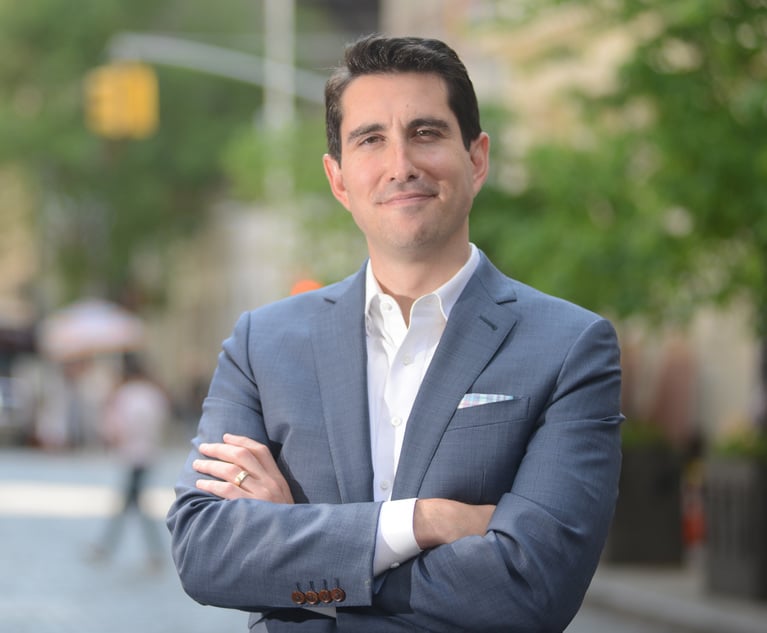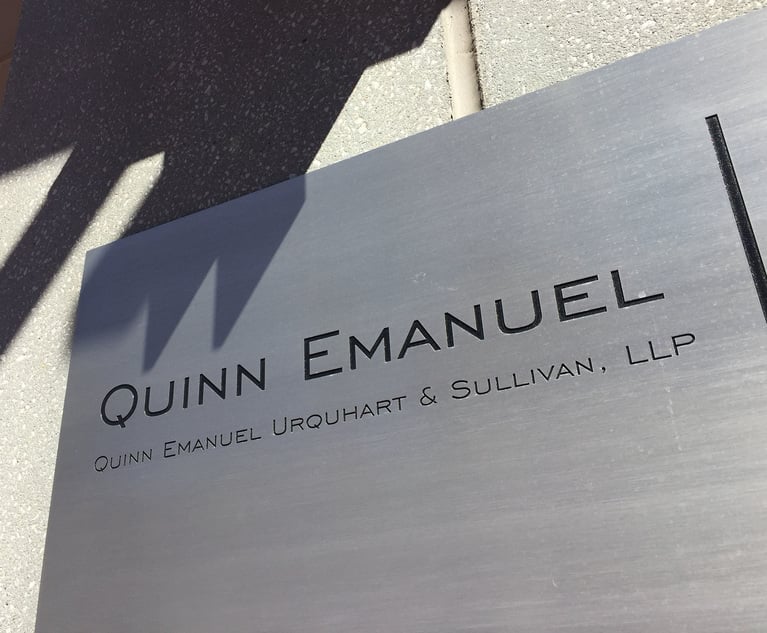Plaintiffs Firms in State Street Probe in Talks to Settle With Special Master
U.S. District Senior Judge Mark Wolf appointed a special master to look into potential overbilling, after a $75 million fee request by the three lead plaintiffs firms.
August 22, 2018 at 06:35 PM
5 minute read
 Senior Judge Mark Wolf of the U.S. District Court for the District of Massachusetts (Courtesy photo)
Senior Judge Mark Wolf of the U.S. District Court for the District of Massachusetts (Courtesy photo)
Labaton Sucharow and two other law firms at the center of a growing public corruption scandal are in talks to settle their objections to a special master's report in securities class actions against financial services provider, State Street Corp., according to court records.
The 377-page special master's report, unsealed in June, highlighted a $4.1 million payment that New York-based Labaton made to Chargois & Herron, a Texas firm with ties to the Arkansas pension fund that is now lead plaintiff in a $300 million settlement with State Street. The report spurred a raft of court filings from Labaton and two other lead plaintiffs firms, the Thornton Law Firm in Boston and San Francisco's Lieff Cabraser Heimann & Bernstein, objecting to the special master's findings. Labaton has insisted the payment was legal.
On Aug. 9, just prior to a hearing, the special master requested that U.S. District Judge Mark Wolf hold a chambers conference “to discuss recent developments concerning possible resolution of this matter.” Last week, the special master, Gerald Rosen, a retired federal judge, wrote that settlement talks were expected to last through Sept. 6.
A Labaton spokesman confirmed there were ongoing discussions but declined to give details.
Wolf appointed Rosen a year ago to look into potential overbilling after a $75 million fee request by the three lead plaintiffs firms. But the special master's report found the referral payment wasn't disclosed and, citing some additional billing irregularities, recommended returning more than $10 million to the class.
This month's hearing was to address whether Rosen had the authority to respond to the numerous objections to his report. The three plaintiffs firms, which have paid $3.8 million so far to fund the report, have insisted that the special master has concluded his assignment.
But Rosen insisted his job isn't over. In a letter unsealed this month, his lawyer, William Sinnott of Boston's Barrett & Singal, cited “numerous references in the report and filed record that could raise reasonable questions about potentially improper political activities.”
The hearing also addressed whether the Center for Class Action Fairness at the Competitive Enterprise Institute could participate as a guardian ad litem for the class.
Ted Frank, the center's director of litigation, said he would be concerned if a proposed settlement “shortchanges the class.” Rosen's report recommended referring Garrett Bradley, managing partner of the Thornton Law Firm, to state bar authorities, but Frank suggested that the special master turn over discovery materials to federal prosecutors in Massachusetts and Arkansas, where lawmakers are investigating the referral fee arrangement.
“The special master's already pulled his punches,” Frank said. “The court is entitled to issue tougher sanctions than what has happened here, and probably should and could issue tougher sanctions.”
In court filings, he noted that Labaton continues to hide its relationship with Chargois & Herron— specifically referencing a case involving investors of Facebook who sued over losses stemming from its initial public offering. The Arkansas Teacher Retirement System is a lead plaintiff in that case, in which Labaton and Bernstein Litowitz Berger & Grossmann filed court documents this month asking for 25 percent of the $35 million settlement fund in attorney fees.
Frank also asked for money to serve that role, both for his organization and for Burch, Porter & Johnson, a Memphis law firm that plans to work with him.
Plaintiffs firms opposed the center's involvement, insisting the class is adequately represented.
In a statement, Labaton said: “Labaton is committed to fulfilling its role as co-lead counsel to the State Street customer class and will continue to assert our privilege to serve in that capacity throughout the duration of the special master's review and the court's ultimate determination.”
In an Aug. 7 brief, lawyers for Labaton and the Thornton Law Firm called the center's request “boldly self-serving” and an “opportunistic payday.”
“There is no need for CCAF to enter this case, and no party or class member has requested it to do so,” wrote Labaton's counsel, Joan Lukey, of Boston's Choate Hall & Stewart, and Brian Kelly of Nixon Peabody in Boston, who represents the Thornton Law Firm. “At bottom, for all its lip service toward protecting the class, CCAF has opportunistically seized a chance to carve out a role for itself in this case, with attendant publicity and potential compensation.”
Labaton also called the allegations about the Facebook IPO case “baseless and false.” In an affidavit, a lead Labaton partner on the case, James Johnson, said that “no referral fee has been paid or will be paid to Damon Chargois in the Facebook case.”
This content has been archived. It is available through our partners, LexisNexis® and Bloomberg Law.
To view this content, please continue to their sites.
Not a Lexis Subscriber?
Subscribe Now
Not a Bloomberg Law Subscriber?
Subscribe Now
NOT FOR REPRINT
© 2025 ALM Global, LLC, All Rights Reserved. Request academic re-use from www.copyright.com. All other uses, submit a request to [email protected]. For more information visit Asset & Logo Licensing.
You Might Like
View All

Kraken’s Chief Legal Officer Exits, Eyes Role in Trump Administration
3 minute read
FTC Chair Lina Khan Sues John Deere Over 'Right to Repair,' Infuriates Successor
6 minute read
Quinn Emanuel Files Countersuit Against DOJ in Row Over Premerger Reporting
3 minute readTrending Stories
- 1The Legal Status of Presidential Diaries Must Be Clarified
- 2Litigators of the Week: Shortly After Name Partner Kathleen Sullivan’s Retirement, Quinn Emanuel Scores Appellate Win for Vimeo
- 3Litigator of the Week Runners-Up and Shout-Outs
- 4Weil Hires White & Case Partner in Rebuild of London Finance Ranks
- 5Morgan Lewis Closes Shenzhen Office After Less Than Two Years
Who Got The Work
J. Brugh Lower of Gibbons has entered an appearance for industrial equipment supplier Devco Corporation in a pending trademark infringement lawsuit. The suit, accusing the defendant of selling knock-off Graco products, was filed Dec. 18 in New Jersey District Court by Rivkin Radler on behalf of Graco Inc. and Graco Minnesota. The case, assigned to U.S. District Judge Zahid N. Quraishi, is 3:24-cv-11294, Graco Inc. et al v. Devco Corporation.
Who Got The Work
Rebecca Maller-Stein and Kent A. Yalowitz of Arnold & Porter Kaye Scholer have entered their appearances for Hanaco Venture Capital and its executives, Lior Prosor and David Frankel, in a pending securities lawsuit. The action, filed on Dec. 24 in New York Southern District Court by Zell, Aron & Co. on behalf of Goldeneye Advisors, accuses the defendants of negligently and fraudulently managing the plaintiff's $1 million investment. The case, assigned to U.S. District Judge Vernon S. Broderick, is 1:24-cv-09918, Goldeneye Advisors, LLC v. Hanaco Venture Capital, Ltd. et al.
Who Got The Work
Attorneys from A&O Shearman has stepped in as defense counsel for Toronto-Dominion Bank and other defendants in a pending securities class action. The suit, filed Dec. 11 in New York Southern District Court by Bleichmar Fonti & Auld, accuses the defendants of concealing the bank's 'pervasive' deficiencies in regards to its compliance with the Bank Secrecy Act and the quality of its anti-money laundering controls. The case, assigned to U.S. District Judge Arun Subramanian, is 1:24-cv-09445, Gonzalez v. The Toronto-Dominion Bank et al.
Who Got The Work
Crown Castle International, a Pennsylvania company providing shared communications infrastructure, has turned to Luke D. Wolf of Gordon Rees Scully Mansukhani to fend off a pending breach-of-contract lawsuit. The court action, filed Nov. 25 in Michigan Eastern District Court by Hooper Hathaway PC on behalf of The Town Residences LLC, accuses Crown Castle of failing to transfer approximately $30,000 in utility payments from T-Mobile in breach of a roof-top lease and assignment agreement. The case, assigned to U.S. District Judge Susan K. Declercq, is 2:24-cv-13131, The Town Residences LLC v. T-Mobile US, Inc. et al.
Who Got The Work
Wilfred P. Coronato and Daniel M. Schwartz of McCarter & English have stepped in as defense counsel to Electrolux Home Products Inc. in a pending product liability lawsuit. The court action, filed Nov. 26 in New York Eastern District Court by Poulos Lopiccolo PC and Nagel Rice LLP on behalf of David Stern, alleges that the defendant's refrigerators’ drawers and shelving repeatedly break and fall apart within months after purchase. The case, assigned to U.S. District Judge Joan M. Azrack, is 2:24-cv-08204, Stern v. Electrolux Home Products, Inc.
Featured Firms
Law Offices of Gary Martin Hays & Associates, P.C.
(470) 294-1674
Law Offices of Mark E. Salomone
(857) 444-6468
Smith & Hassler
(713) 739-1250










